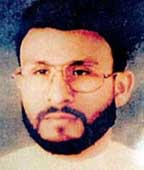
In his speech yesterday, the president said this:
In addition to the terrorists held at Guantanamo, a small number of suspected terrorist leaders and operatives captured during the war have been held and questioned outside the United States, in a separate program operated by the Central Intelligence Agency. This group includes individuals believed to be the key architects of the September the 11th attacks, and attacks on the USS Cole, an operative involved in the bombings of our embassies in Kenya and Tanzania, and individuals involved in other attacks that have taken the lives of innocent civilians across the world. These are dangerous men with unparalleled knowledge about terrorist networks and their plans for new attacks. The security of our nation and the lives of our citizens depend on our ability to learn what these terrorists know.
Many specifics of this program, including where these detainees have been held and the details of their confinement, cannot be divulged. Doing so would provide our enemies with information they could use to take retribution against our allies and harm our country. I can say that questioning the detainees in this program has given us information that has saved innocent lives by helping us stop new attacks — here in the United States and across the world. Today, I’m going to share with you some of the examples provided by our intelligence community of how this program has saved lives; why it remains vital to the security of the United States, and our friends and allies; and why it deserves the support of the United States Congress and the American people.
Those examples include that of Abu Zubaydah, whom Bush called “a senior terrorist leader and a trusted associate of Osama bin Laden.”
We knew that Zubaydah had more information that could save innocent lives, but he stopped talking. As his questioning proceeded, it became clear that he had received training on how to resist interrogation. And so the CIA used an alternative set of procedures. These procedures were designed to be safe, to comply with our laws, our Constitution, and our treaty obligations. The Department of Justice reviewed the authorized methods extensively and determined them to be lawful. I cannot describe the specific methods used — I think you understand why — if I did, it would help the terrorists learn how to resist questioning, and to keep information from us that we need to prevent new attacks on our country. But I can say the procedures were tough, and they were safe, and lawful, and necessary.
Our timeline tells a different story about Al-Zubaydah.
March 28, 2002
Al Qaeda operative Abu Zubaydah is captured in Pakistan. A highly prized target whom administration officials will call a “chief operator,” Zubaydah is later found to be severely mentally ill and in charge only of al Qaeda’s minor logistics. He arranges travel for wives and children, for example, and has little to do with the “operational,” side of the network’s activities.
April 9, 2002
Bush: “The other day we hauled in a guy named Abu Zubaydah. He’s one of the top operatives plotting and planning death and destruction on the United States.” Members of the Administration call Zubaydah a “chief operator” and a “member of Osama bin Laden’s inner circle“
When Bush is informed of Zubaydah’s true stature within Al Qaeda, Bush says to Tenet, “I said he was important. You’re not going to let me lose face on this, are you?” Tenet’s reply: “No sir, Mr. President.” The CIA has top medical professionals fly to Pakistan to fix up the wounds Zubaydah sustained in his capture. “We got him in very good health, so we could start to torture him,” says one CIA official.
As time passes Tenet begins pushing his staff for something he can take to the President, anything to support the President’s public statements about Zubaydah. In a comment exemplifying CIA resentment, one top agency officials says, “Bush and Cheney knew what we knew about Zubaydah…why the hell did the President have to put us in a box like this?”
The CIA tortures Zubaydah until he starts talking about plots against shopping malls, banks, supermarkets, water systems, and apartment buildings. Writes reporter Ron Suskind in his book “The One Percent Doctrine,” “the United States would torture a mentally disturbed man and then leap, screaming, at every word he uttered.”
Just for the record.















